Ethical Dilemmas and CSR at Uber: A Business Report Analysis
VerifiedAdded on 2023/01/12
|11
|3358
|25
Report
AI Summary
This report provides a comprehensive analysis of the ethical issues confronting Uber, focusing on corporate social responsibility (CSR) and its practical application. The study examines specific challenges such as sexual harassment allegations, the use of the 'Greyball' software to evade regulators, and data privacy concerns. It employs Carroll’s pyramid model of CSR and applies normative and descriptive business ethics theories to assess Uber's practices. The report evaluates the impact of both ethical and unethical actions on internal and external stakeholders, including employees, customers, and regulators. Based on these findings, the report offers recommendations for Uber to improve its ethical conduct and CSR initiatives, aiming for enhanced stakeholder trust and sustainable business practices.
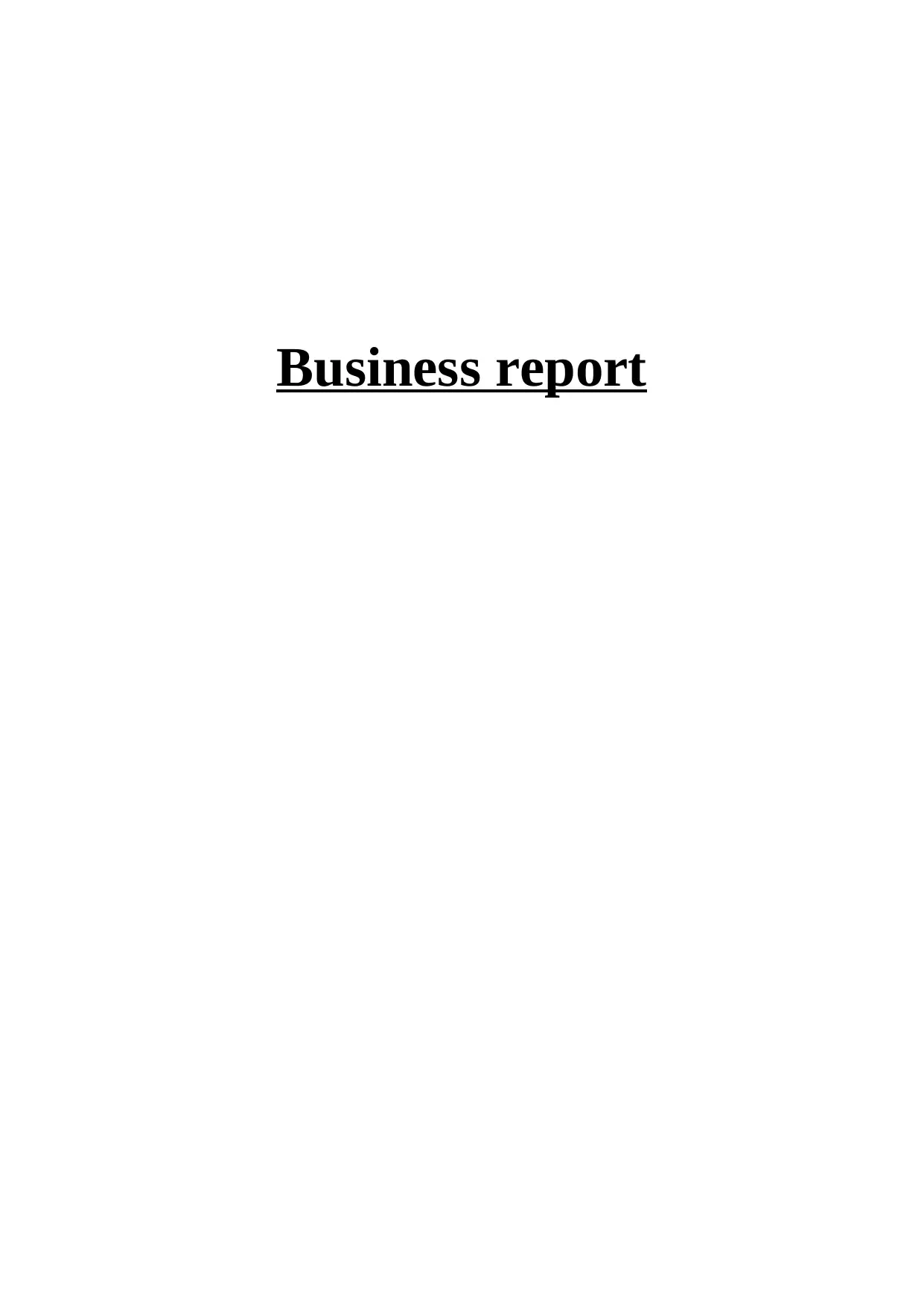
Business report
Paraphrase This Document
Need a fresh take? Get an instant paraphrase of this document with our AI Paraphraser
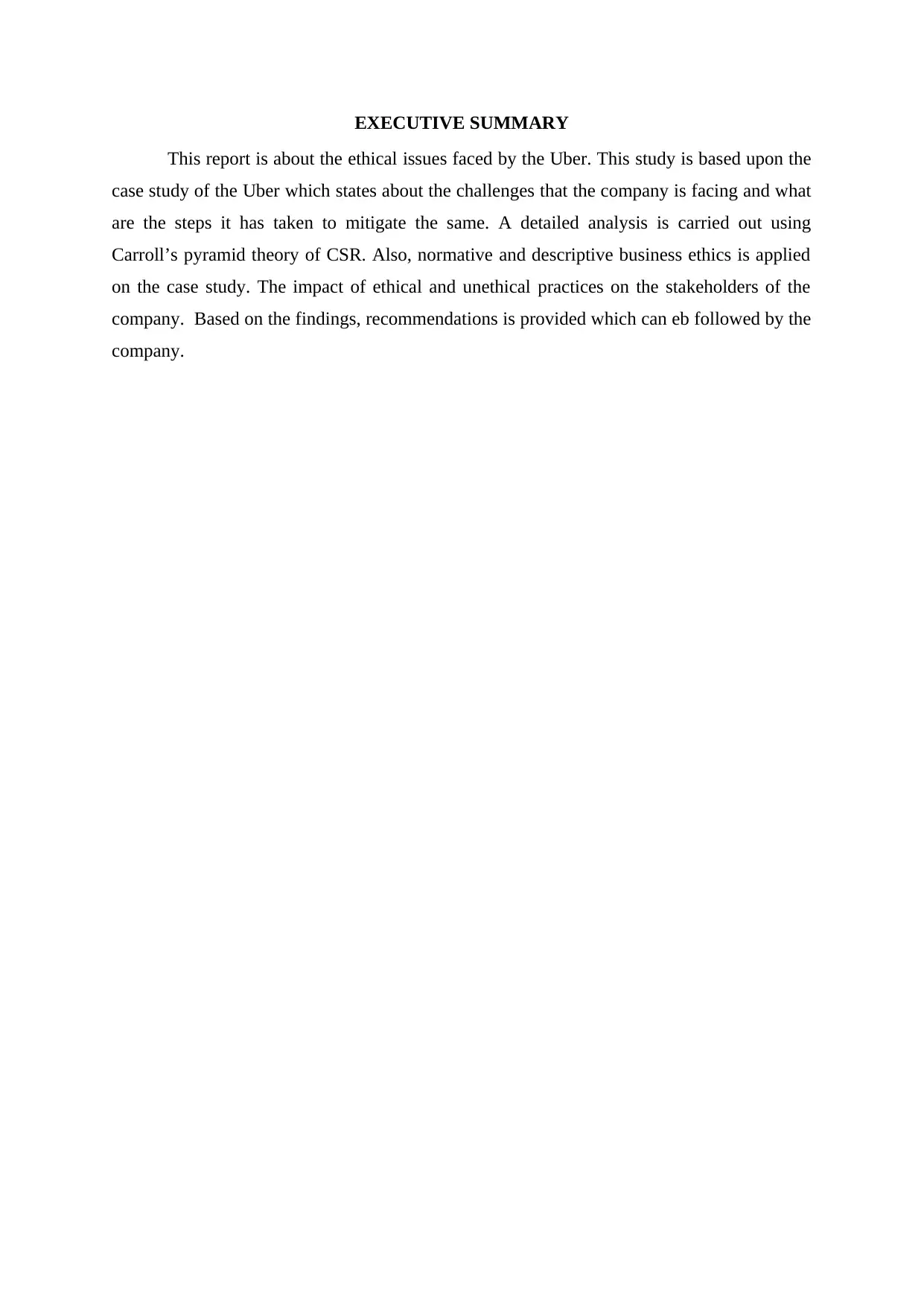
EXECUTIVE SUMMARY
This report is about the ethical issues faced by the Uber. This study is based upon the
case study of the Uber which states about the challenges that the company is facing and what
are the steps it has taken to mitigate the same. A detailed analysis is carried out using
Carroll’s pyramid theory of CSR. Also, normative and descriptive business ethics is applied
on the case study. The impact of ethical and unethical practices on the stakeholders of the
company. Based on the findings, recommendations is provided which can eb followed by the
company.
This report is about the ethical issues faced by the Uber. This study is based upon the
case study of the Uber which states about the challenges that the company is facing and what
are the steps it has taken to mitigate the same. A detailed analysis is carried out using
Carroll’s pyramid theory of CSR. Also, normative and descriptive business ethics is applied
on the case study. The impact of ethical and unethical practices on the stakeholders of the
company. Based on the findings, recommendations is provided which can eb followed by the
company.
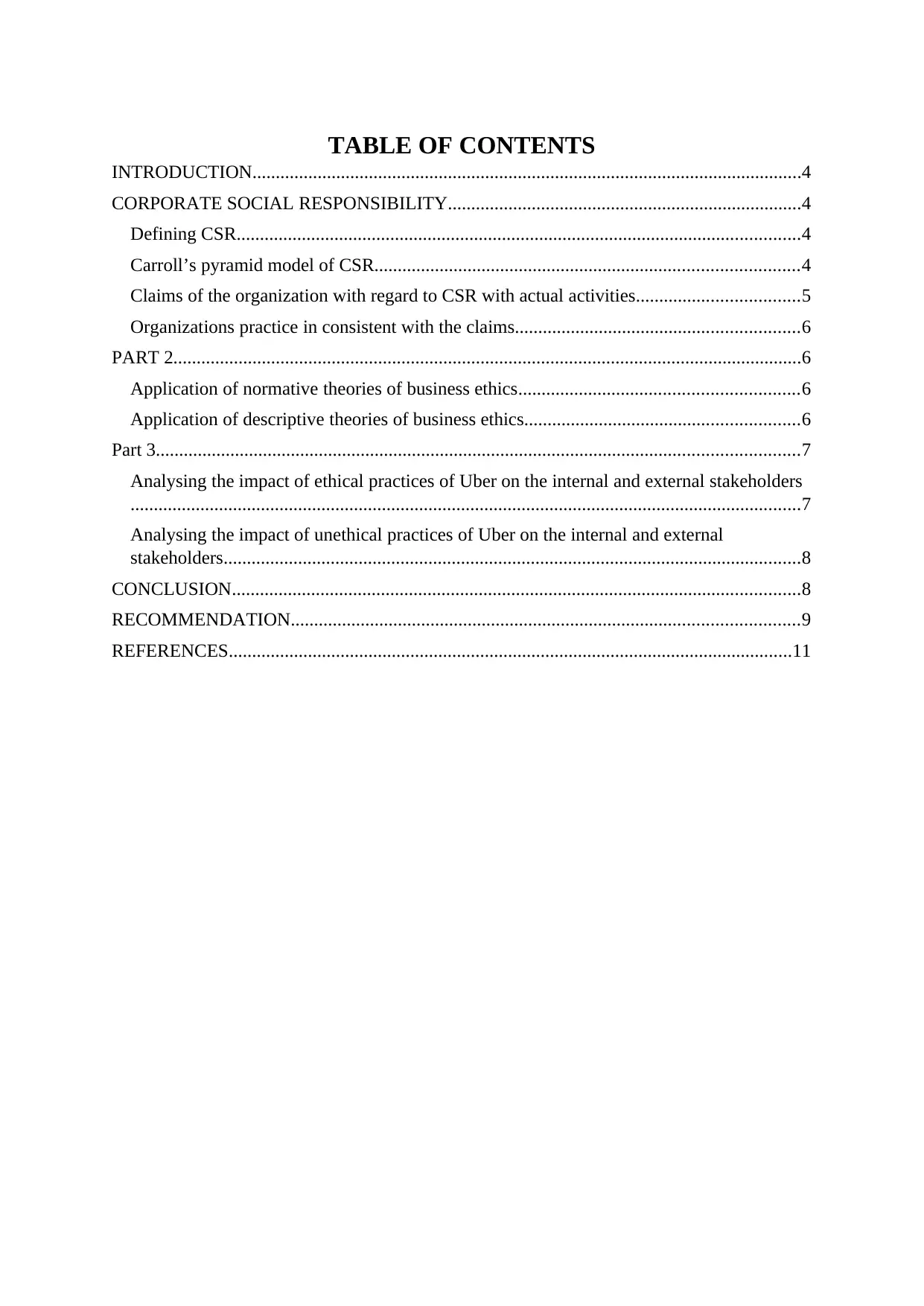
TABLE OF CONTENTS
INTRODUCTION......................................................................................................................4
CORPORATE SOCIAL RESPONSIBILITY............................................................................4
Defining CSR.........................................................................................................................4
Carroll’s pyramid model of CSR...........................................................................................4
Claims of the organization with regard to CSR with actual activities...................................5
Organizations practice in consistent with the claims.............................................................6
PART 2.......................................................................................................................................6
Application of normative theories of business ethics............................................................6
Application of descriptive theories of business ethics...........................................................6
Part 3..........................................................................................................................................7
Analysing the impact of ethical practices of Uber on the internal and external stakeholders
................................................................................................................................................7
Analysing the impact of unethical practices of Uber on the internal and external
stakeholders............................................................................................................................8
CONCLUSION..........................................................................................................................8
RECOMMENDATION.............................................................................................................9
REFERENCES.........................................................................................................................11
INTRODUCTION......................................................................................................................4
CORPORATE SOCIAL RESPONSIBILITY............................................................................4
Defining CSR.........................................................................................................................4
Carroll’s pyramid model of CSR...........................................................................................4
Claims of the organization with regard to CSR with actual activities...................................5
Organizations practice in consistent with the claims.............................................................6
PART 2.......................................................................................................................................6
Application of normative theories of business ethics............................................................6
Application of descriptive theories of business ethics...........................................................6
Part 3..........................................................................................................................................7
Analysing the impact of ethical practices of Uber on the internal and external stakeholders
................................................................................................................................................7
Analysing the impact of unethical practices of Uber on the internal and external
stakeholders............................................................................................................................8
CONCLUSION..........................................................................................................................8
RECOMMENDATION.............................................................................................................9
REFERENCES.........................................................................................................................11
⊘ This is a preview!⊘
Do you want full access?
Subscribe today to unlock all pages.

Trusted by 1+ million students worldwide
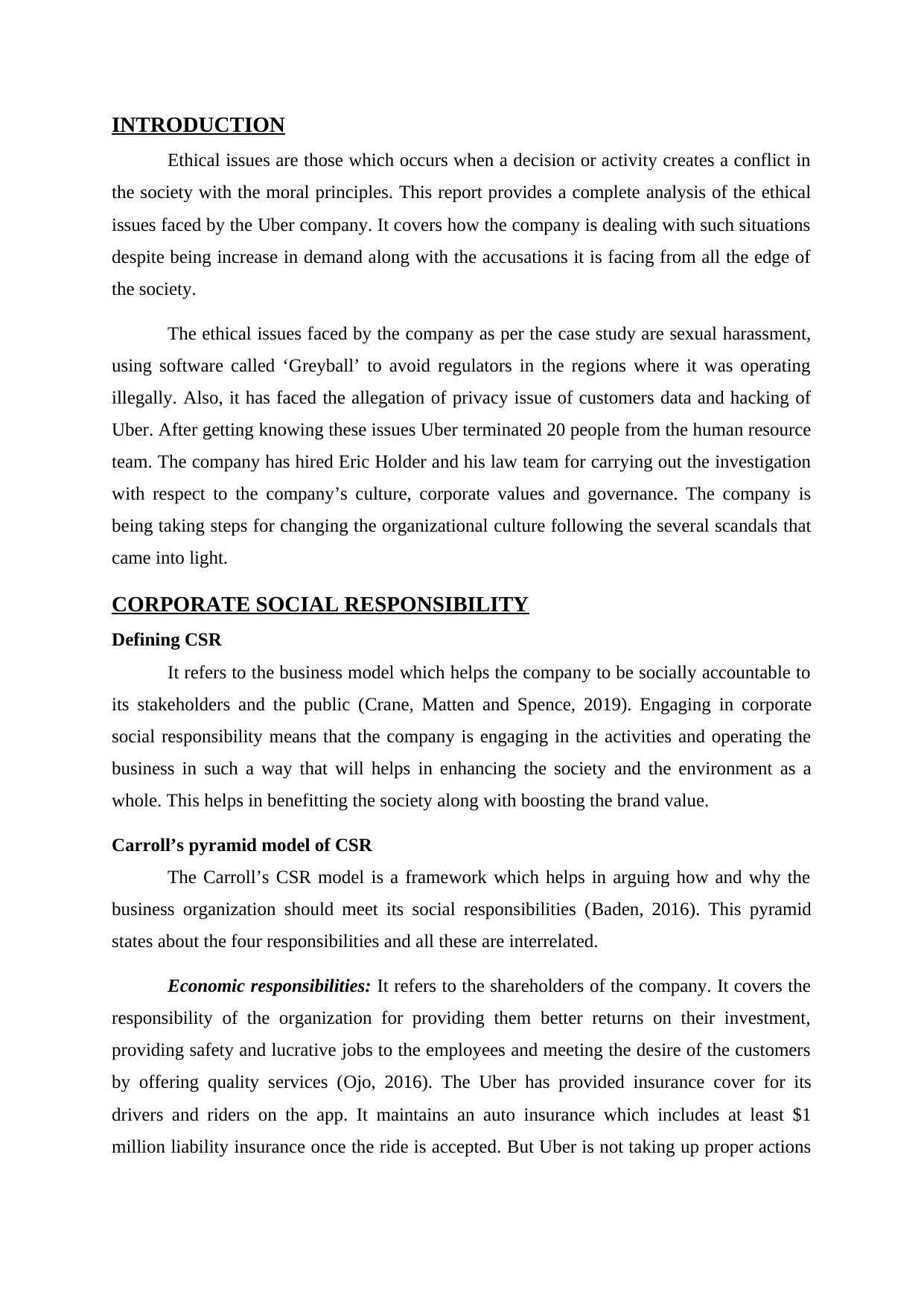
INTRODUCTION
Ethical issues are those which occurs when a decision or activity creates a conflict in
the society with the moral principles. This report provides a complete analysis of the ethical
issues faced by the Uber company. It covers how the company is dealing with such situations
despite being increase in demand along with the accusations it is facing from all the edge of
the society.
The ethical issues faced by the company as per the case study are sexual harassment,
using software called ‘Greyball’ to avoid regulators in the regions where it was operating
illegally. Also, it has faced the allegation of privacy issue of customers data and hacking of
Uber. After getting knowing these issues Uber terminated 20 people from the human resource
team. The company has hired Eric Holder and his law team for carrying out the investigation
with respect to the company’s culture, corporate values and governance. The company is
being taking steps for changing the organizational culture following the several scandals that
came into light.
CORPORATE SOCIAL RESPONSIBILITY
Defining CSR
It refers to the business model which helps the company to be socially accountable to
its stakeholders and the public (Crane, Matten and Spence, 2019). Engaging in corporate
social responsibility means that the company is engaging in the activities and operating the
business in such a way that will helps in enhancing the society and the environment as a
whole. This helps in benefitting the society along with boosting the brand value.
Carroll’s pyramid model of CSR
The Carroll’s CSR model is a framework which helps in arguing how and why the
business organization should meet its social responsibilities (Baden, 2016). This pyramid
states about the four responsibilities and all these are interrelated.
Economic responsibilities: It refers to the shareholders of the company. It covers the
responsibility of the organization for providing them better returns on their investment,
providing safety and lucrative jobs to the employees and meeting the desire of the customers
by offering quality services (Ojo, 2016). The Uber has provided insurance cover for its
drivers and riders on the app. It maintains an auto insurance which includes at least $1
million liability insurance once the ride is accepted. But Uber is not taking up proper actions
Ethical issues are those which occurs when a decision or activity creates a conflict in
the society with the moral principles. This report provides a complete analysis of the ethical
issues faced by the Uber company. It covers how the company is dealing with such situations
despite being increase in demand along with the accusations it is facing from all the edge of
the society.
The ethical issues faced by the company as per the case study are sexual harassment,
using software called ‘Greyball’ to avoid regulators in the regions where it was operating
illegally. Also, it has faced the allegation of privacy issue of customers data and hacking of
Uber. After getting knowing these issues Uber terminated 20 people from the human resource
team. The company has hired Eric Holder and his law team for carrying out the investigation
with respect to the company’s culture, corporate values and governance. The company is
being taking steps for changing the organizational culture following the several scandals that
came into light.
CORPORATE SOCIAL RESPONSIBILITY
Defining CSR
It refers to the business model which helps the company to be socially accountable to
its stakeholders and the public (Crane, Matten and Spence, 2019). Engaging in corporate
social responsibility means that the company is engaging in the activities and operating the
business in such a way that will helps in enhancing the society and the environment as a
whole. This helps in benefitting the society along with boosting the brand value.
Carroll’s pyramid model of CSR
The Carroll’s CSR model is a framework which helps in arguing how and why the
business organization should meet its social responsibilities (Baden, 2016). This pyramid
states about the four responsibilities and all these are interrelated.
Economic responsibilities: It refers to the shareholders of the company. It covers the
responsibility of the organization for providing them better returns on their investment,
providing safety and lucrative jobs to the employees and meeting the desire of the customers
by offering quality services (Ojo, 2016). The Uber has provided insurance cover for its
drivers and riders on the app. It maintains an auto insurance which includes at least $1
million liability insurance once the ride is accepted. But Uber is not taking up proper actions
Paraphrase This Document
Need a fresh take? Get an instant paraphrase of this document with our AI Paraphraser
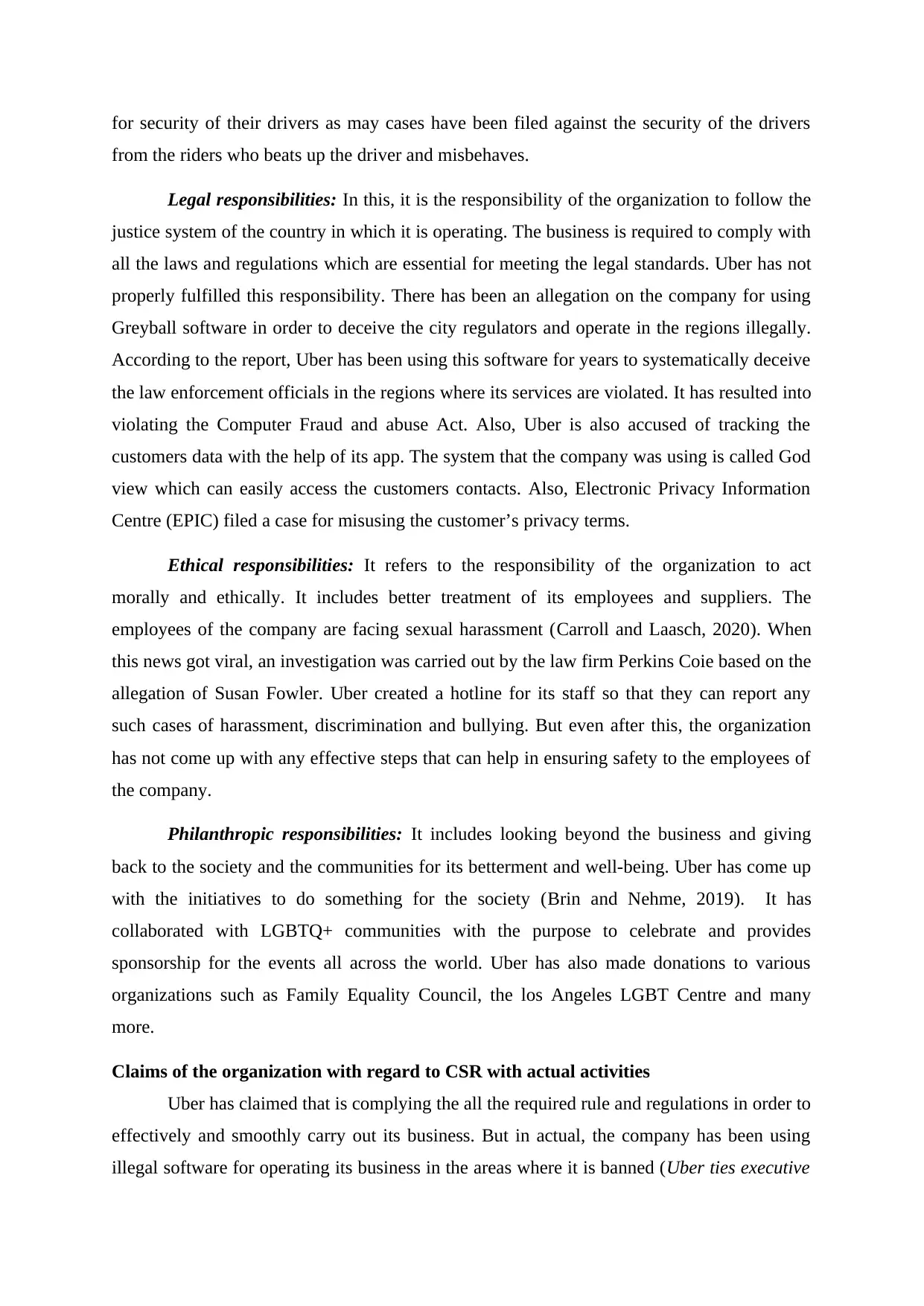
for security of their drivers as may cases have been filed against the security of the drivers
from the riders who beats up the driver and misbehaves.
Legal responsibilities: In this, it is the responsibility of the organization to follow the
justice system of the country in which it is operating. The business is required to comply with
all the laws and regulations which are essential for meeting the legal standards. Uber has not
properly fulfilled this responsibility. There has been an allegation on the company for using
Greyball software in order to deceive the city regulators and operate in the regions illegally.
According to the report, Uber has been using this software for years to systematically deceive
the law enforcement officials in the regions where its services are violated. It has resulted into
violating the Computer Fraud and abuse Act. Also, Uber is also accused of tracking the
customers data with the help of its app. The system that the company was using is called God
view which can easily access the customers contacts. Also, Electronic Privacy Information
Centre (EPIC) filed a case for misusing the customer’s privacy terms.
Ethical responsibilities: It refers to the responsibility of the organization to act
morally and ethically. It includes better treatment of its employees and suppliers. The
employees of the company are facing sexual harassment (Carroll and Laasch, 2020). When
this news got viral, an investigation was carried out by the law firm Perkins Coie based on the
allegation of Susan Fowler. Uber created a hotline for its staff so that they can report any
such cases of harassment, discrimination and bullying. But even after this, the organization
has not come up with any effective steps that can help in ensuring safety to the employees of
the company.
Philanthropic responsibilities: It includes looking beyond the business and giving
back to the society and the communities for its betterment and well-being. Uber has come up
with the initiatives to do something for the society (Brin and Nehme, 2019). It has
collaborated with LGBTQ+ communities with the purpose to celebrate and provides
sponsorship for the events all across the world. Uber has also made donations to various
organizations such as Family Equality Council, the los Angeles LGBT Centre and many
more.
Claims of the organization with regard to CSR with actual activities
Uber has claimed that is complying the all the required rule and regulations in order to
effectively and smoothly carry out its business. But in actual, the company has been using
illegal software for operating its business in the areas where it is banned (Uber ties executive
from the riders who beats up the driver and misbehaves.
Legal responsibilities: In this, it is the responsibility of the organization to follow the
justice system of the country in which it is operating. The business is required to comply with
all the laws and regulations which are essential for meeting the legal standards. Uber has not
properly fulfilled this responsibility. There has been an allegation on the company for using
Greyball software in order to deceive the city regulators and operate in the regions illegally.
According to the report, Uber has been using this software for years to systematically deceive
the law enforcement officials in the regions where its services are violated. It has resulted into
violating the Computer Fraud and abuse Act. Also, Uber is also accused of tracking the
customers data with the help of its app. The system that the company was using is called God
view which can easily access the customers contacts. Also, Electronic Privacy Information
Centre (EPIC) filed a case for misusing the customer’s privacy terms.
Ethical responsibilities: It refers to the responsibility of the organization to act
morally and ethically. It includes better treatment of its employees and suppliers. The
employees of the company are facing sexual harassment (Carroll and Laasch, 2020). When
this news got viral, an investigation was carried out by the law firm Perkins Coie based on the
allegation of Susan Fowler. Uber created a hotline for its staff so that they can report any
such cases of harassment, discrimination and bullying. But even after this, the organization
has not come up with any effective steps that can help in ensuring safety to the employees of
the company.
Philanthropic responsibilities: It includes looking beyond the business and giving
back to the society and the communities for its betterment and well-being. Uber has come up
with the initiatives to do something for the society (Brin and Nehme, 2019). It has
collaborated with LGBTQ+ communities with the purpose to celebrate and provides
sponsorship for the events all across the world. Uber has also made donations to various
organizations such as Family Equality Council, the los Angeles LGBT Centre and many
more.
Claims of the organization with regard to CSR with actual activities
Uber has claimed that is complying the all the required rule and regulations in order to
effectively and smoothly carry out its business. But in actual, the company has been using
illegal software for operating its business in the areas where it is banned (Uber ties executive
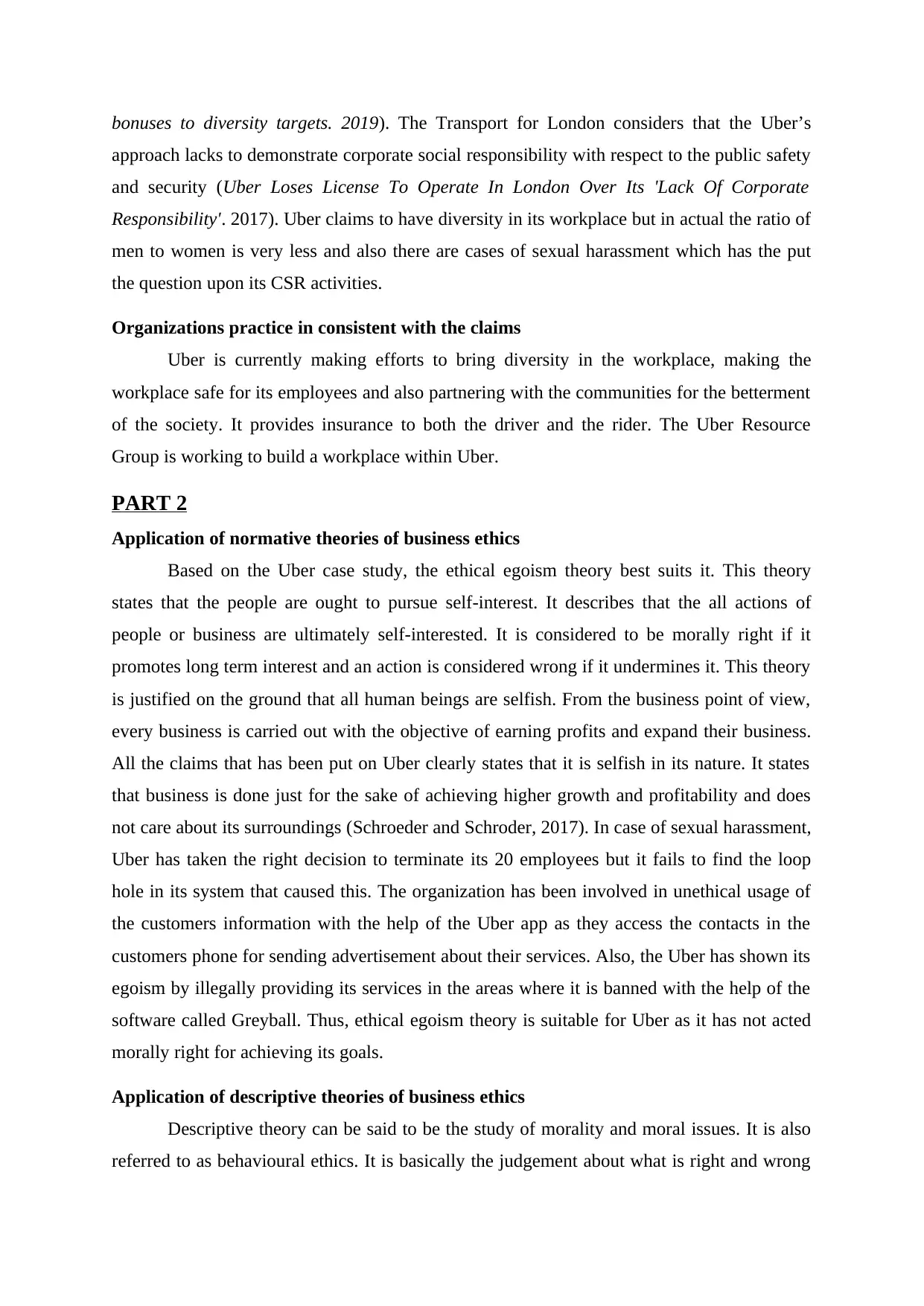
bonuses to diversity targets. 2019). The Transport for London considers that the Uber’s
approach lacks to demonstrate corporate social responsibility with respect to the public safety
and security (Uber Loses License To Operate In London Over Its 'Lack Of Corporate
Responsibility'. 2017). Uber claims to have diversity in its workplace but in actual the ratio of
men to women is very less and also there are cases of sexual harassment which has the put
the question upon its CSR activities.
Organizations practice in consistent with the claims
Uber is currently making efforts to bring diversity in the workplace, making the
workplace safe for its employees and also partnering with the communities for the betterment
of the society. It provides insurance to both the driver and the rider. The Uber Resource
Group is working to build a workplace within Uber.
PART 2
Application of normative theories of business ethics
Based on the Uber case study, the ethical egoism theory best suits it. This theory
states that the people are ought to pursue self-interest. It describes that the all actions of
people or business are ultimately self-interested. It is considered to be morally right if it
promotes long term interest and an action is considered wrong if it undermines it. This theory
is justified on the ground that all human beings are selfish. From the business point of view,
every business is carried out with the objective of earning profits and expand their business.
All the claims that has been put on Uber clearly states that it is selfish in its nature. It states
that business is done just for the sake of achieving higher growth and profitability and does
not care about its surroundings (Schroeder and Schroder, 2017). In case of sexual harassment,
Uber has taken the right decision to terminate its 20 employees but it fails to find the loop
hole in its system that caused this. The organization has been involved in unethical usage of
the customers information with the help of the Uber app as they access the contacts in the
customers phone for sending advertisement about their services. Also, the Uber has shown its
egoism by illegally providing its services in the areas where it is banned with the help of the
software called Greyball. Thus, ethical egoism theory is suitable for Uber as it has not acted
morally right for achieving its goals.
Application of descriptive theories of business ethics
Descriptive theory can be said to be the study of morality and moral issues. It is also
referred to as behavioural ethics. It is basically the judgement about what is right and wrong
approach lacks to demonstrate corporate social responsibility with respect to the public safety
and security (Uber Loses License To Operate In London Over Its 'Lack Of Corporate
Responsibility'. 2017). Uber claims to have diversity in its workplace but in actual the ratio of
men to women is very less and also there are cases of sexual harassment which has the put
the question upon its CSR activities.
Organizations practice in consistent with the claims
Uber is currently making efforts to bring diversity in the workplace, making the
workplace safe for its employees and also partnering with the communities for the betterment
of the society. It provides insurance to both the driver and the rider. The Uber Resource
Group is working to build a workplace within Uber.
PART 2
Application of normative theories of business ethics
Based on the Uber case study, the ethical egoism theory best suits it. This theory
states that the people are ought to pursue self-interest. It describes that the all actions of
people or business are ultimately self-interested. It is considered to be morally right if it
promotes long term interest and an action is considered wrong if it undermines it. This theory
is justified on the ground that all human beings are selfish. From the business point of view,
every business is carried out with the objective of earning profits and expand their business.
All the claims that has been put on Uber clearly states that it is selfish in its nature. It states
that business is done just for the sake of achieving higher growth and profitability and does
not care about its surroundings (Schroeder and Schroder, 2017). In case of sexual harassment,
Uber has taken the right decision to terminate its 20 employees but it fails to find the loop
hole in its system that caused this. The organization has been involved in unethical usage of
the customers information with the help of the Uber app as they access the contacts in the
customers phone for sending advertisement about their services. Also, the Uber has shown its
egoism by illegally providing its services in the areas where it is banned with the help of the
software called Greyball. Thus, ethical egoism theory is suitable for Uber as it has not acted
morally right for achieving its goals.
Application of descriptive theories of business ethics
Descriptive theory can be said to be the study of morality and moral issues. It is also
referred to as behavioural ethics. It is basically the judgement about what is right and wrong
⊘ This is a preview!⊘
Do you want full access?
Subscribe today to unlock all pages.

Trusted by 1+ million students worldwide
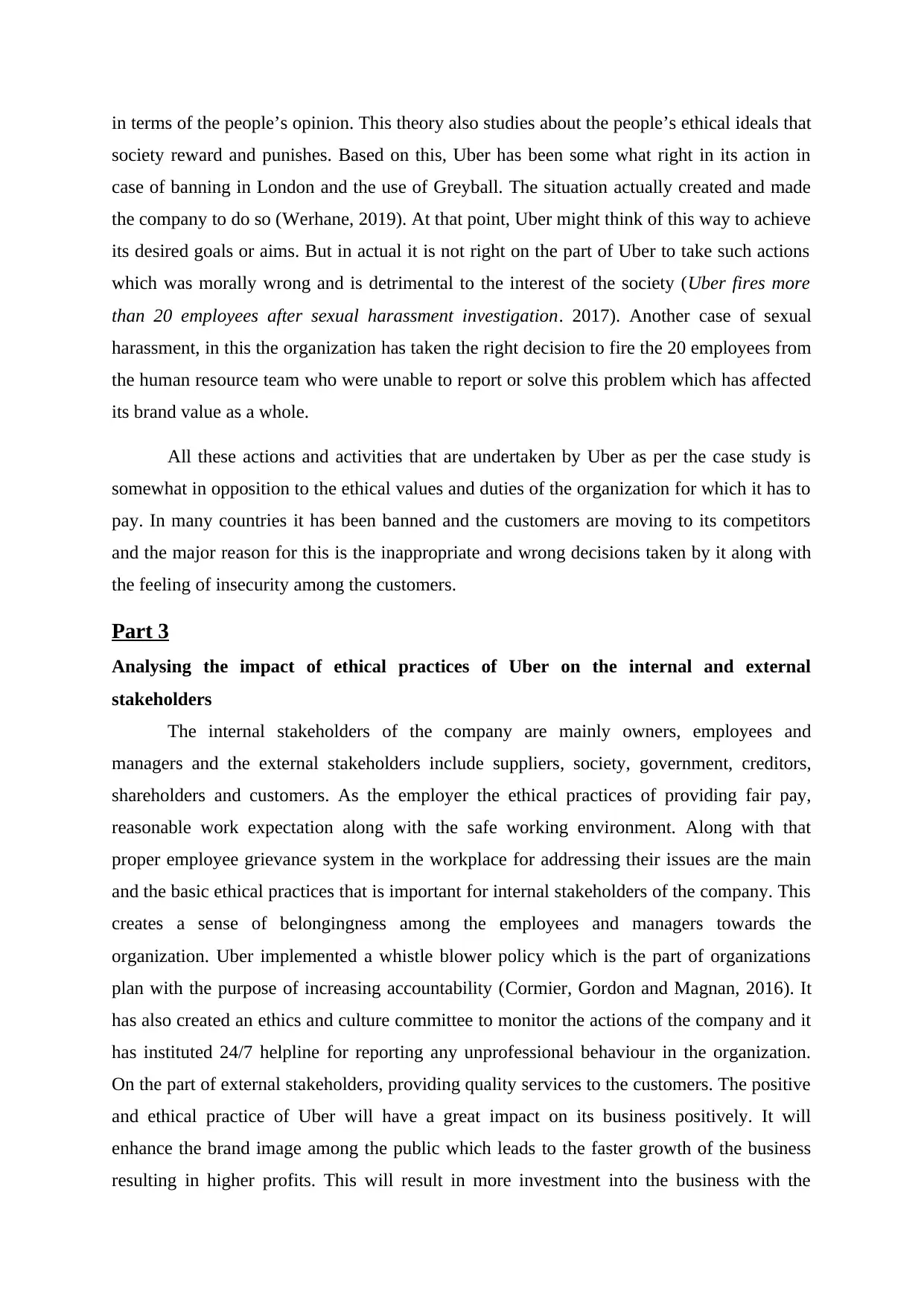
in terms of the people’s opinion. This theory also studies about the people’s ethical ideals that
society reward and punishes. Based on this, Uber has been some what right in its action in
case of banning in London and the use of Greyball. The situation actually created and made
the company to do so (Werhane, 2019). At that point, Uber might think of this way to achieve
its desired goals or aims. But in actual it is not right on the part of Uber to take such actions
which was morally wrong and is detrimental to the interest of the society (Uber fires more
than 20 employees after sexual harassment investigation. 2017). Another case of sexual
harassment, in this the organization has taken the right decision to fire the 20 employees from
the human resource team who were unable to report or solve this problem which has affected
its brand value as a whole.
All these actions and activities that are undertaken by Uber as per the case study is
somewhat in opposition to the ethical values and duties of the organization for which it has to
pay. In many countries it has been banned and the customers are moving to its competitors
and the major reason for this is the inappropriate and wrong decisions taken by it along with
the feeling of insecurity among the customers.
Part 3
Analysing the impact of ethical practices of Uber on the internal and external
stakeholders
The internal stakeholders of the company are mainly owners, employees and
managers and the external stakeholders include suppliers, society, government, creditors,
shareholders and customers. As the employer the ethical practices of providing fair pay,
reasonable work expectation along with the safe working environment. Along with that
proper employee grievance system in the workplace for addressing their issues are the main
and the basic ethical practices that is important for internal stakeholders of the company. This
creates a sense of belongingness among the employees and managers towards the
organization. Uber implemented a whistle blower policy which is the part of organizations
plan with the purpose of increasing accountability (Cormier, Gordon and Magnan, 2016). It
has also created an ethics and culture committee to monitor the actions of the company and it
has instituted 24/7 helpline for reporting any unprofessional behaviour in the organization.
On the part of external stakeholders, providing quality services to the customers. The positive
and ethical practice of Uber will have a great impact on its business positively. It will
enhance the brand image among the public which leads to the faster growth of the business
resulting in higher profits. This will result in more investment into the business with the
society reward and punishes. Based on this, Uber has been some what right in its action in
case of banning in London and the use of Greyball. The situation actually created and made
the company to do so (Werhane, 2019). At that point, Uber might think of this way to achieve
its desired goals or aims. But in actual it is not right on the part of Uber to take such actions
which was morally wrong and is detrimental to the interest of the society (Uber fires more
than 20 employees after sexual harassment investigation. 2017). Another case of sexual
harassment, in this the organization has taken the right decision to fire the 20 employees from
the human resource team who were unable to report or solve this problem which has affected
its brand value as a whole.
All these actions and activities that are undertaken by Uber as per the case study is
somewhat in opposition to the ethical values and duties of the organization for which it has to
pay. In many countries it has been banned and the customers are moving to its competitors
and the major reason for this is the inappropriate and wrong decisions taken by it along with
the feeling of insecurity among the customers.
Part 3
Analysing the impact of ethical practices of Uber on the internal and external
stakeholders
The internal stakeholders of the company are mainly owners, employees and
managers and the external stakeholders include suppliers, society, government, creditors,
shareholders and customers. As the employer the ethical practices of providing fair pay,
reasonable work expectation along with the safe working environment. Along with that
proper employee grievance system in the workplace for addressing their issues are the main
and the basic ethical practices that is important for internal stakeholders of the company. This
creates a sense of belongingness among the employees and managers towards the
organization. Uber implemented a whistle blower policy which is the part of organizations
plan with the purpose of increasing accountability (Cormier, Gordon and Magnan, 2016). It
has also created an ethics and culture committee to monitor the actions of the company and it
has instituted 24/7 helpline for reporting any unprofessional behaviour in the organization.
On the part of external stakeholders, providing quality services to the customers. The positive
and ethical practice of Uber will have a great impact on its business positively. It will
enhance the brand image among the public which leads to the faster growth of the business
resulting in higher profits. This will result in more investment into the business with the
Paraphrase This Document
Need a fresh take? Get an instant paraphrase of this document with our AI Paraphraser
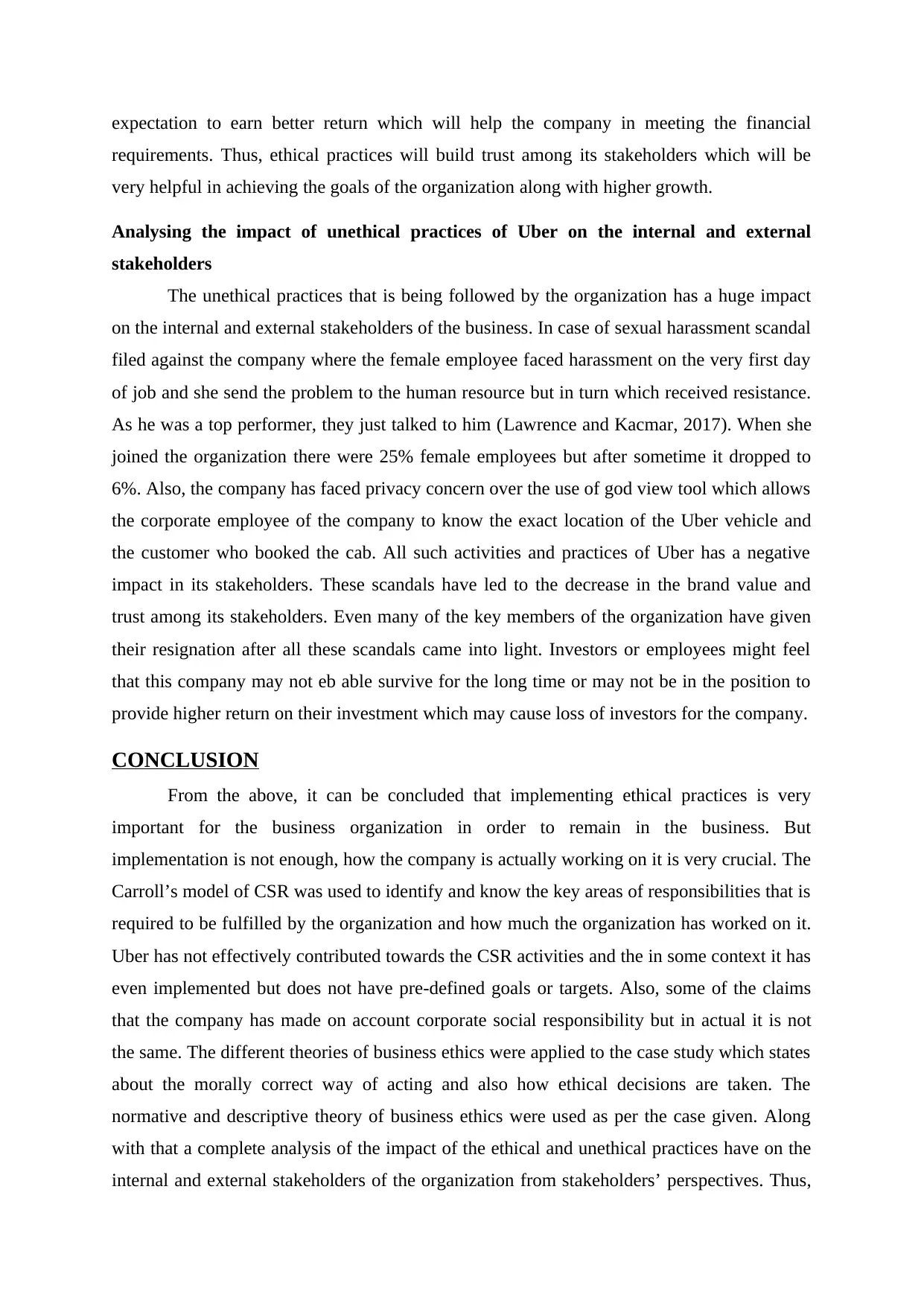
expectation to earn better return which will help the company in meeting the financial
requirements. Thus, ethical practices will build trust among its stakeholders which will be
very helpful in achieving the goals of the organization along with higher growth.
Analysing the impact of unethical practices of Uber on the internal and external
stakeholders
The unethical practices that is being followed by the organization has a huge impact
on the internal and external stakeholders of the business. In case of sexual harassment scandal
filed against the company where the female employee faced harassment on the very first day
of job and she send the problem to the human resource but in turn which received resistance.
As he was a top performer, they just talked to him (Lawrence and Kacmar, 2017). When she
joined the organization there were 25% female employees but after sometime it dropped to
6%. Also, the company has faced privacy concern over the use of god view tool which allows
the corporate employee of the company to know the exact location of the Uber vehicle and
the customer who booked the cab. All such activities and practices of Uber has a negative
impact in its stakeholders. These scandals have led to the decrease in the brand value and
trust among its stakeholders. Even many of the key members of the organization have given
their resignation after all these scandals came into light. Investors or employees might feel
that this company may not eb able survive for the long time or may not be in the position to
provide higher return on their investment which may cause loss of investors for the company.
CONCLUSION
From the above, it can be concluded that implementing ethical practices is very
important for the business organization in order to remain in the business. But
implementation is not enough, how the company is actually working on it is very crucial. The
Carroll’s model of CSR was used to identify and know the key areas of responsibilities that is
required to be fulfilled by the organization and how much the organization has worked on it.
Uber has not effectively contributed towards the CSR activities and the in some context it has
even implemented but does not have pre-defined goals or targets. Also, some of the claims
that the company has made on account corporate social responsibility but in actual it is not
the same. The different theories of business ethics were applied to the case study which states
about the morally correct way of acting and also how ethical decisions are taken. The
normative and descriptive theory of business ethics were used as per the case given. Along
with that a complete analysis of the impact of the ethical and unethical practices have on the
internal and external stakeholders of the organization from stakeholders’ perspectives. Thus,
requirements. Thus, ethical practices will build trust among its stakeholders which will be
very helpful in achieving the goals of the organization along with higher growth.
Analysing the impact of unethical practices of Uber on the internal and external
stakeholders
The unethical practices that is being followed by the organization has a huge impact
on the internal and external stakeholders of the business. In case of sexual harassment scandal
filed against the company where the female employee faced harassment on the very first day
of job and she send the problem to the human resource but in turn which received resistance.
As he was a top performer, they just talked to him (Lawrence and Kacmar, 2017). When she
joined the organization there were 25% female employees but after sometime it dropped to
6%. Also, the company has faced privacy concern over the use of god view tool which allows
the corporate employee of the company to know the exact location of the Uber vehicle and
the customer who booked the cab. All such activities and practices of Uber has a negative
impact in its stakeholders. These scandals have led to the decrease in the brand value and
trust among its stakeholders. Even many of the key members of the organization have given
their resignation after all these scandals came into light. Investors or employees might feel
that this company may not eb able survive for the long time or may not be in the position to
provide higher return on their investment which may cause loss of investors for the company.
CONCLUSION
From the above, it can be concluded that implementing ethical practices is very
important for the business organization in order to remain in the business. But
implementation is not enough, how the company is actually working on it is very crucial. The
Carroll’s model of CSR was used to identify and know the key areas of responsibilities that is
required to be fulfilled by the organization and how much the organization has worked on it.
Uber has not effectively contributed towards the CSR activities and the in some context it has
even implemented but does not have pre-defined goals or targets. Also, some of the claims
that the company has made on account corporate social responsibility but in actual it is not
the same. The different theories of business ethics were applied to the case study which states
about the morally correct way of acting and also how ethical decisions are taken. The
normative and descriptive theory of business ethics were used as per the case given. Along
with that a complete analysis of the impact of the ethical and unethical practices have on the
internal and external stakeholders of the organization from stakeholders’ perspectives. Thus,
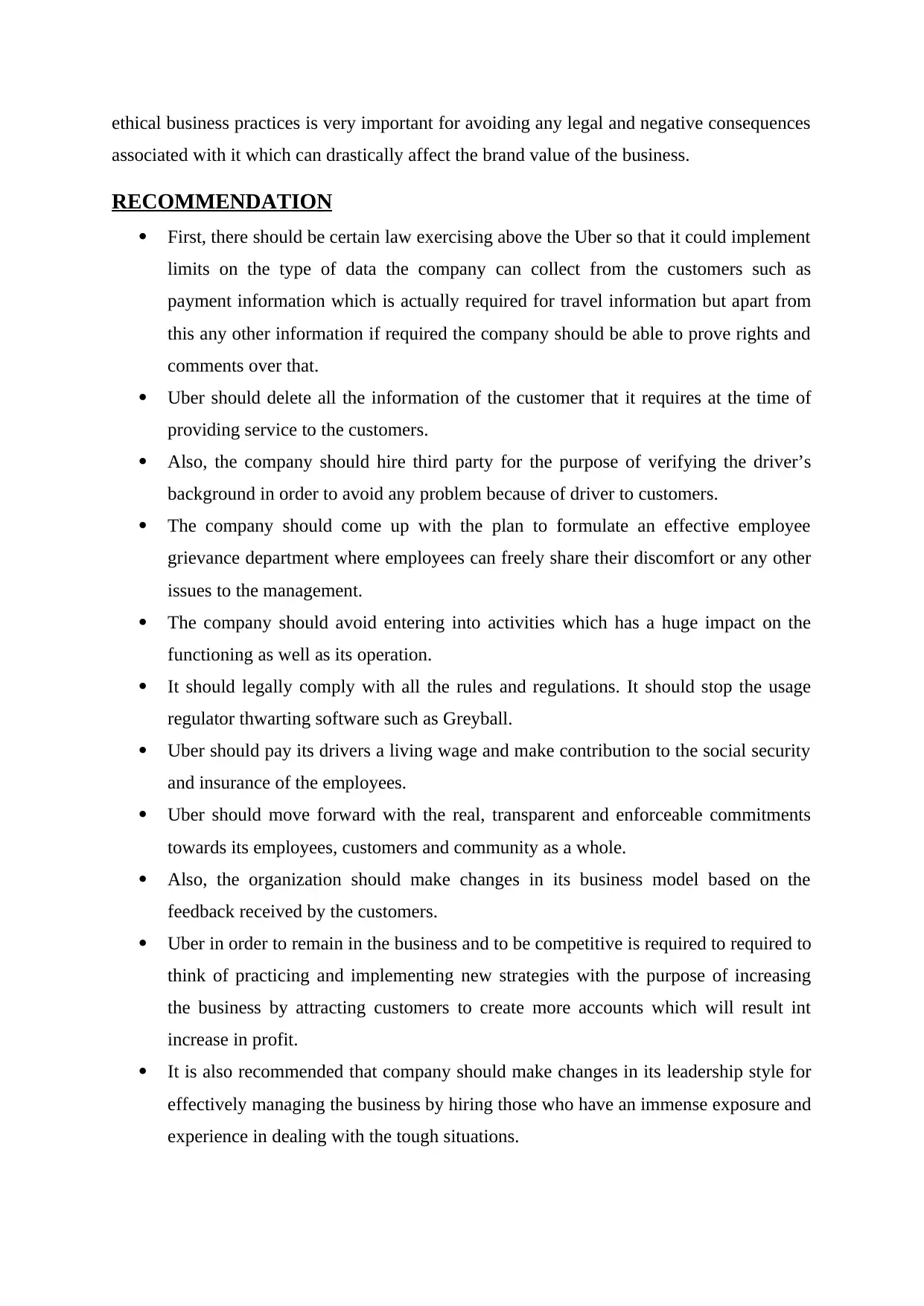
ethical business practices is very important for avoiding any legal and negative consequences
associated with it which can drastically affect the brand value of the business.
RECOMMENDATION
First, there should be certain law exercising above the Uber so that it could implement
limits on the type of data the company can collect from the customers such as
payment information which is actually required for travel information but apart from
this any other information if required the company should be able to prove rights and
comments over that.
Uber should delete all the information of the customer that it requires at the time of
providing service to the customers.
Also, the company should hire third party for the purpose of verifying the driver’s
background in order to avoid any problem because of driver to customers.
The company should come up with the plan to formulate an effective employee
grievance department where employees can freely share their discomfort or any other
issues to the management.
The company should avoid entering into activities which has a huge impact on the
functioning as well as its operation.
It should legally comply with all the rules and regulations. It should stop the usage
regulator thwarting software such as Greyball.
Uber should pay its drivers a living wage and make contribution to the social security
and insurance of the employees.
Uber should move forward with the real, transparent and enforceable commitments
towards its employees, customers and community as a whole.
Also, the organization should make changes in its business model based on the
feedback received by the customers.
Uber in order to remain in the business and to be competitive is required to required to
think of practicing and implementing new strategies with the purpose of increasing
the business by attracting customers to create more accounts which will result int
increase in profit.
It is also recommended that company should make changes in its leadership style for
effectively managing the business by hiring those who have an immense exposure and
experience in dealing with the tough situations.
associated with it which can drastically affect the brand value of the business.
RECOMMENDATION
First, there should be certain law exercising above the Uber so that it could implement
limits on the type of data the company can collect from the customers such as
payment information which is actually required for travel information but apart from
this any other information if required the company should be able to prove rights and
comments over that.
Uber should delete all the information of the customer that it requires at the time of
providing service to the customers.
Also, the company should hire third party for the purpose of verifying the driver’s
background in order to avoid any problem because of driver to customers.
The company should come up with the plan to formulate an effective employee
grievance department where employees can freely share their discomfort or any other
issues to the management.
The company should avoid entering into activities which has a huge impact on the
functioning as well as its operation.
It should legally comply with all the rules and regulations. It should stop the usage
regulator thwarting software such as Greyball.
Uber should pay its drivers a living wage and make contribution to the social security
and insurance of the employees.
Uber should move forward with the real, transparent and enforceable commitments
towards its employees, customers and community as a whole.
Also, the organization should make changes in its business model based on the
feedback received by the customers.
Uber in order to remain in the business and to be competitive is required to required to
think of practicing and implementing new strategies with the purpose of increasing
the business by attracting customers to create more accounts which will result int
increase in profit.
It is also recommended that company should make changes in its leadership style for
effectively managing the business by hiring those who have an immense exposure and
experience in dealing with the tough situations.
⊘ This is a preview!⊘
Do you want full access?
Subscribe today to unlock all pages.

Trusted by 1+ million students worldwide
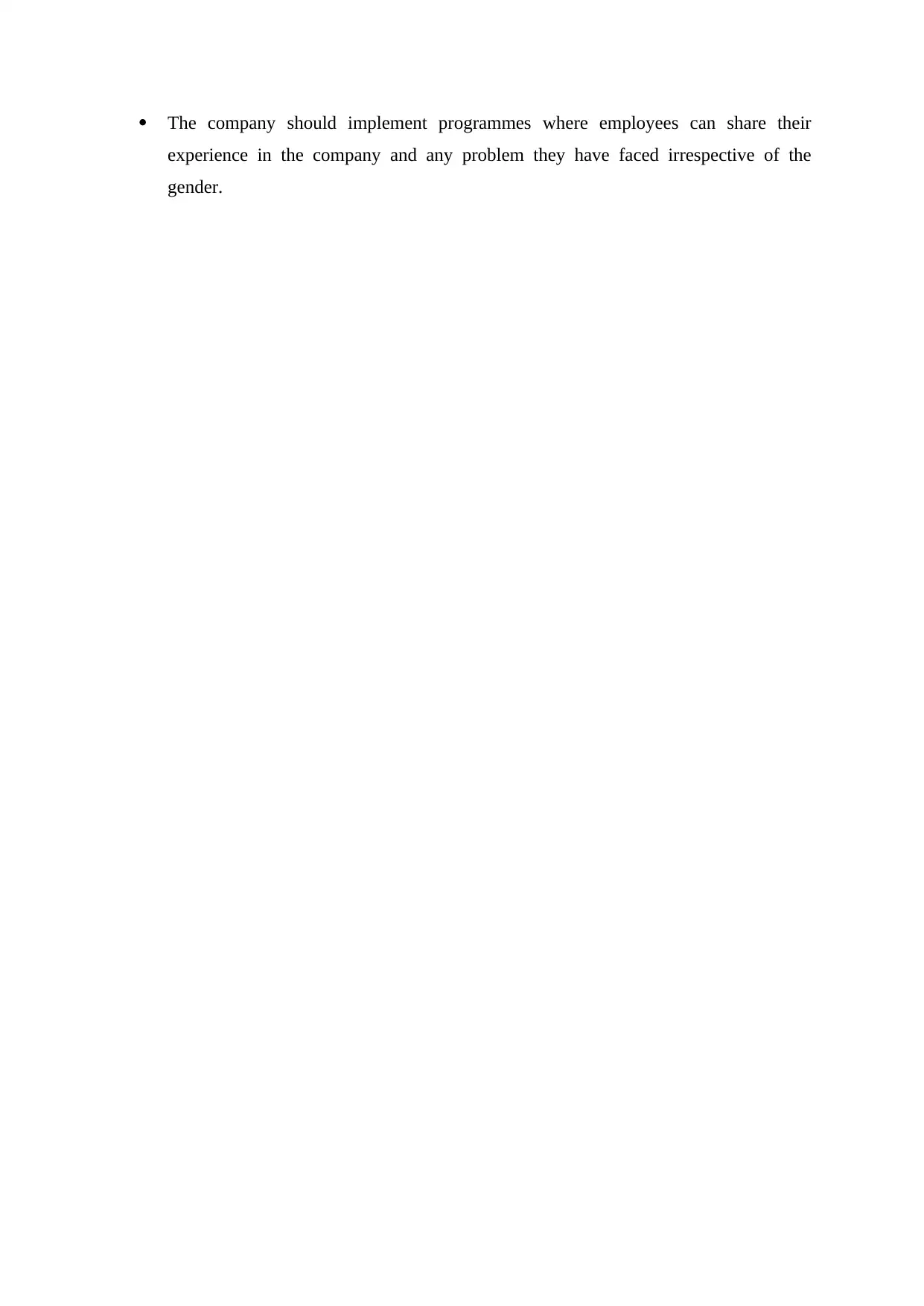
The company should implement programmes where employees can share their
experience in the company and any problem they have faced irrespective of the
gender.
experience in the company and any problem they have faced irrespective of the
gender.
Paraphrase This Document
Need a fresh take? Get an instant paraphrase of this document with our AI Paraphraser
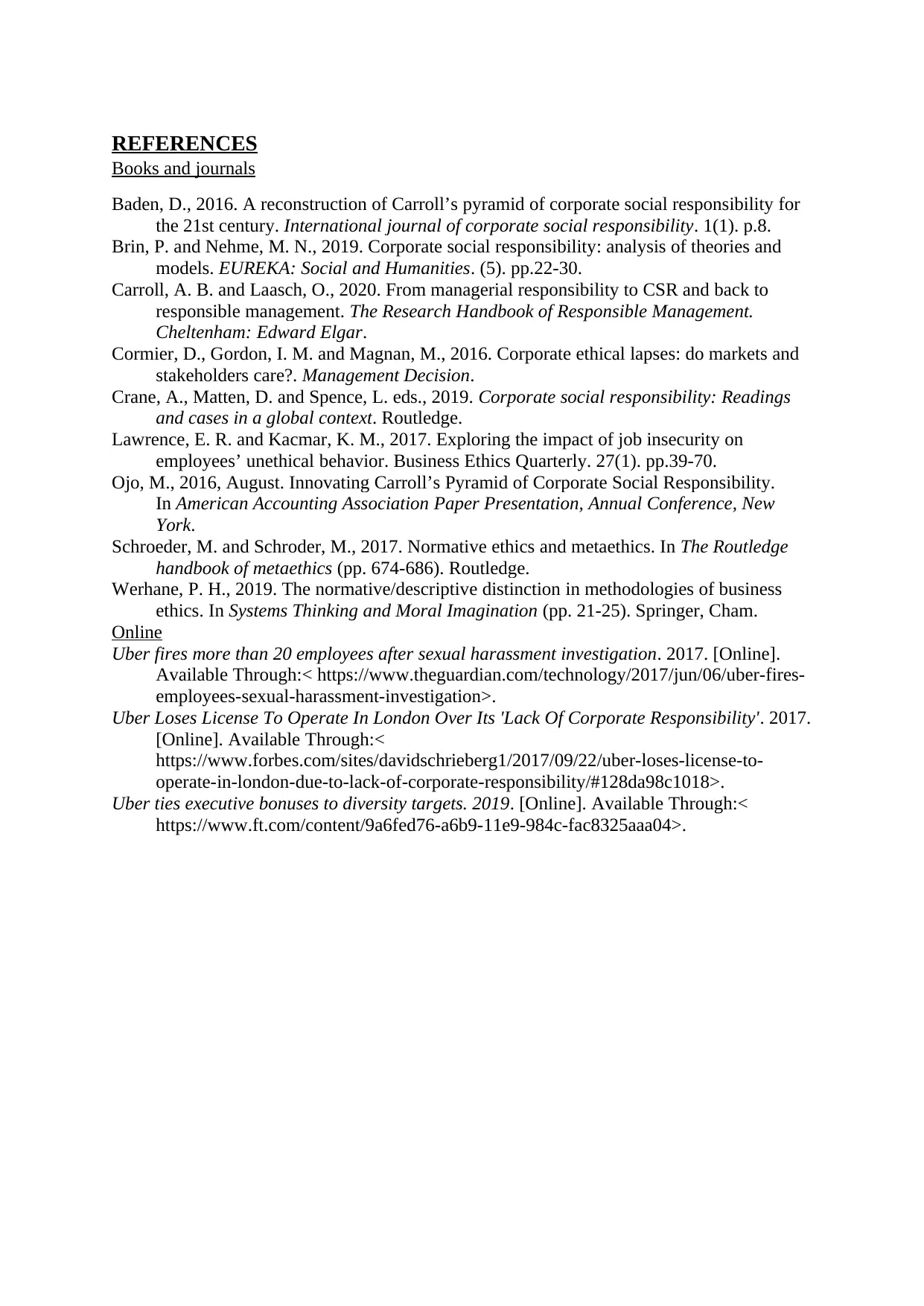
REFERENCES
Books and journals
Baden, D., 2016. A reconstruction of Carroll’s pyramid of corporate social responsibility for
the 21st century. International journal of corporate social responsibility. 1(1). p.8.
Brin, P. and Nehme, M. N., 2019. Corporate social responsibility: analysis of theories and
models. EUREKA: Social and Humanities. (5). pp.22-30.
Carroll, A. B. and Laasch, O., 2020. From managerial responsibility to CSR and back to
responsible management. The Research Handbook of Responsible Management.
Cheltenham: Edward Elgar.
Cormier, D., Gordon, I. M. and Magnan, M., 2016. Corporate ethical lapses: do markets and
stakeholders care?. Management Decision.
Crane, A., Matten, D. and Spence, L. eds., 2019. Corporate social responsibility: Readings
and cases in a global context. Routledge.
Lawrence, E. R. and Kacmar, K. M., 2017. Exploring the impact of job insecurity on
employees’ unethical behavior. Business Ethics Quarterly. 27(1). pp.39-70.
Ojo, M., 2016, August. Innovating Carroll’s Pyramid of Corporate Social Responsibility.
In American Accounting Association Paper Presentation, Annual Conference, New
York.
Schroeder, M. and Schroder, M., 2017. Normative ethics and metaethics. In The Routledge
handbook of metaethics (pp. 674-686). Routledge.
Werhane, P. H., 2019. The normative/descriptive distinction in methodologies of business
ethics. In Systems Thinking and Moral Imagination (pp. 21-25). Springer, Cham.
Online
Uber fires more than 20 employees after sexual harassment investigation. 2017. [Online].
Available Through:< https://www.theguardian.com/technology/2017/jun/06/uber-fires-
employees-sexual-harassment-investigation>.
Uber Loses License To Operate In London Over Its 'Lack Of Corporate Responsibility'. 2017.
[Online]. Available Through:<
https://www.forbes.com/sites/davidschrieberg1/2017/09/22/uber-loses-license-to-
operate-in-london-due-to-lack-of-corporate-responsibility/#128da98c1018>.
Uber ties executive bonuses to diversity targets. 2019. [Online]. Available Through:<
https://www.ft.com/content/9a6fed76-a6b9-11e9-984c-fac8325aaa04>.
Books and journals
Baden, D., 2016. A reconstruction of Carroll’s pyramid of corporate social responsibility for
the 21st century. International journal of corporate social responsibility. 1(1). p.8.
Brin, P. and Nehme, M. N., 2019. Corporate social responsibility: analysis of theories and
models. EUREKA: Social and Humanities. (5). pp.22-30.
Carroll, A. B. and Laasch, O., 2020. From managerial responsibility to CSR and back to
responsible management. The Research Handbook of Responsible Management.
Cheltenham: Edward Elgar.
Cormier, D., Gordon, I. M. and Magnan, M., 2016. Corporate ethical lapses: do markets and
stakeholders care?. Management Decision.
Crane, A., Matten, D. and Spence, L. eds., 2019. Corporate social responsibility: Readings
and cases in a global context. Routledge.
Lawrence, E. R. and Kacmar, K. M., 2017. Exploring the impact of job insecurity on
employees’ unethical behavior. Business Ethics Quarterly. 27(1). pp.39-70.
Ojo, M., 2016, August. Innovating Carroll’s Pyramid of Corporate Social Responsibility.
In American Accounting Association Paper Presentation, Annual Conference, New
York.
Schroeder, M. and Schroder, M., 2017. Normative ethics and metaethics. In The Routledge
handbook of metaethics (pp. 674-686). Routledge.
Werhane, P. H., 2019. The normative/descriptive distinction in methodologies of business
ethics. In Systems Thinking and Moral Imagination (pp. 21-25). Springer, Cham.
Online
Uber fires more than 20 employees after sexual harassment investigation. 2017. [Online].
Available Through:< https://www.theguardian.com/technology/2017/jun/06/uber-fires-
employees-sexual-harassment-investigation>.
Uber Loses License To Operate In London Over Its 'Lack Of Corporate Responsibility'. 2017.
[Online]. Available Through:<
https://www.forbes.com/sites/davidschrieberg1/2017/09/22/uber-loses-license-to-
operate-in-london-due-to-lack-of-corporate-responsibility/#128da98c1018>.
Uber ties executive bonuses to diversity targets. 2019. [Online]. Available Through:<
https://www.ft.com/content/9a6fed76-a6b9-11e9-984c-fac8325aaa04>.
1 out of 11
Related Documents
Your All-in-One AI-Powered Toolkit for Academic Success.
+13062052269
info@desklib.com
Available 24*7 on WhatsApp / Email
![[object Object]](/_next/static/media/star-bottom.7253800d.svg)
Unlock your academic potential
Copyright © 2020–2026 A2Z Services. All Rights Reserved. Developed and managed by ZUCOL.





